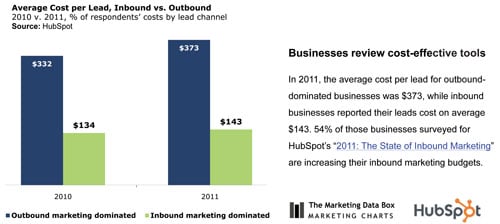Marketing in the age of the Internet and Social Media
For years marketing has been a function of trying to determine what people want, crafting a message to speak to that need or desire, and pushing out a message to a targeted audience that says something along the lines of: “our product or service can fill that need”. Let’s call this method of marketing traditional advertising. This method still works but its effectiveness is diminishing. In a study by The Marketing Data Box and Hubspot the cost of a traditionally generation leads was about two and a half times more costly than those coming from Internet marketing sources.

A new paradigm
Traditional advertising emphasizes only one side of a conversation—the seller’s side of the equation. Prospects and customers can only watch, listen to or read an ad that is on TV, radio or in print. With Internet marketing this paradigm has shifted 180 degrees. By using a search engine like Google anyone who has Internet access (and this is probably most of your potential customers) can quickly find out a great deal about just about any product or service under the sun.
Customer empowered
Not only can your customers find out about products and services they can find out about you, your company and how you do business. In this client empowered space people are demanding, and in many cases getting, a different kind of communication from the companies they buy products and services from. Marketing communication of this sort emphasizes a two-way conversation.
The social business model
So what do people want from businesses these days? Transparency is probably the biggest concern. People want to know what is going on behind the curtain. If the Occupy Wall Street movement tells us anything its that people are sick and tired of not knowing what goes on behind closed doors because this breeds a bad deal for them. This means that everyone in the company is going to become a marketer in that they can (or should) be available via social media outlets like Twitter to answer questions from existing or potential customers.
Social responsibility
Social responsibility can mean a lot of things. Here are a few important items: corporate citizenship and self-regulation integrated, highly ethical behavior, voluntarily eliminating practices that harm the public, and honoring the triple bottom line: people, planet, profit. In their book Firms of Endearment: How World-Class Companies Profit from Passion and Purpose authors Rajendra S. Sisodia, David B. Wolfe, and Jagdish N. Sheth demonstrate the social paradigm is actually a superior profit engine than more traditional excellence driven approaches.
MORE RECENT BLOGS
How to structure your all-important offer! (in 90 seconds)
Your offer is the entry point into the sales process. A good offer sets up success; a lackluster one doesn’t. Here are best practices: A good offer co...
Graphic Design: Setting Tone and Mood On Your Site
As the Internet continues to develop and evolve and show us new ways to market, we're continually finding new ways of "embedding" messages into our co...
AI is Changing Business. Are You Ready?
In a world where AI is surging, our innate human intuition is becoming more crucial than ever before. An AI class just for you Artificial Intelligence...
Create Content for the Three Initial Marketing Stages
Hey, here's a riddle for you: What is the single most important part of your business, which will always be beyond your control? The answer? Your cust...
Is It Time For a Website Redesign?
You'd have to be pretty satisfied with the performance of your website not to occasionally look at it and wonder if it's time to redesign it. After al...




